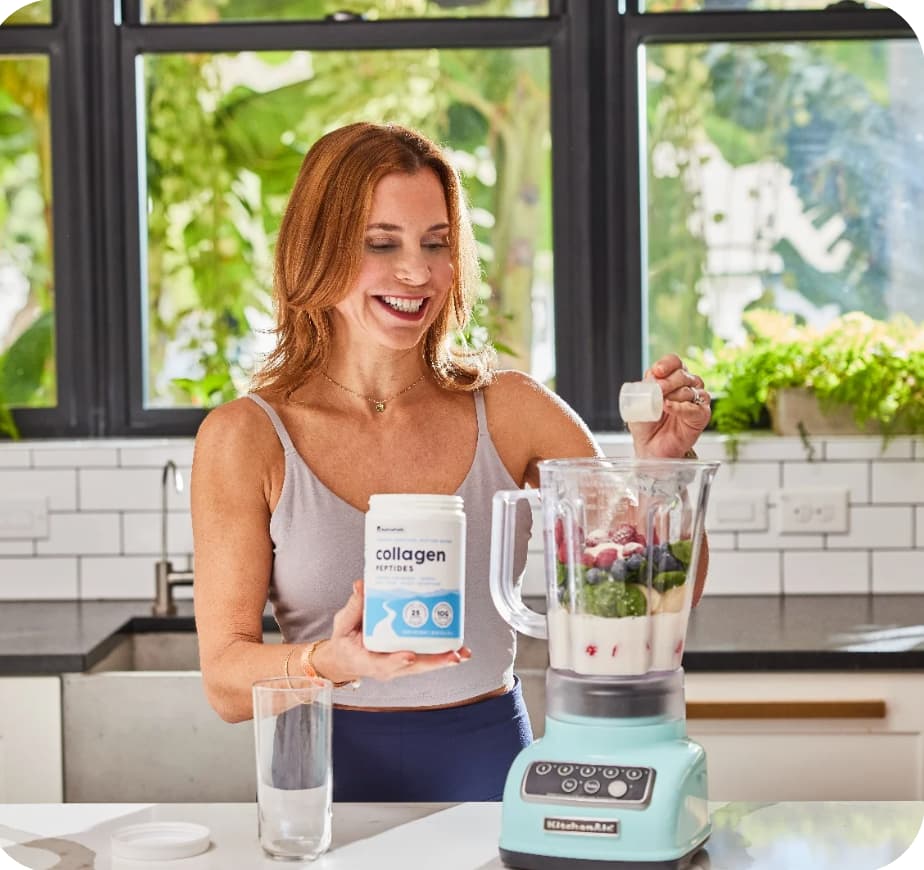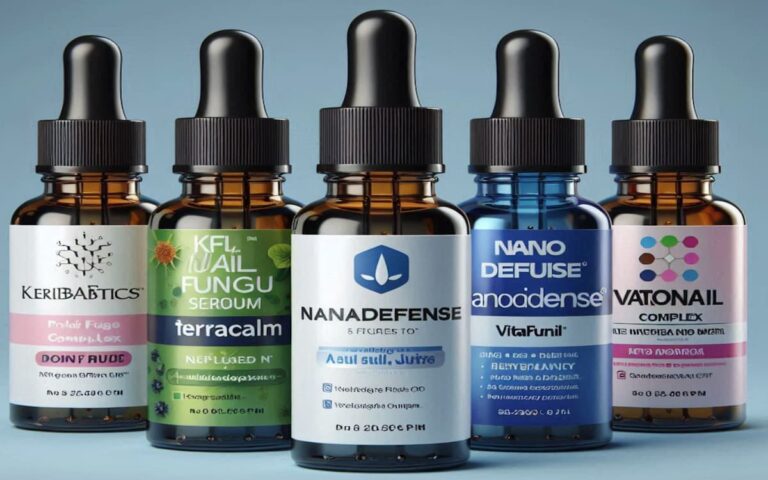Collagen Supplements for Skin: Your Guide to Firmer, Brighter Skin
Wrinkles, sagging, and dullness can sneak up on your skin. Many people want to keep their skin looking firm and vibrant as they get older.
This often leads them to consider supplements. This collagen supplements for skin review looks at a popular option. It covers what collagen is, how these supplements might help your skin, and what you should look for when buying them.
Key Takeaways:
- Collagen is a key protein for skin structure and elasticity.2
- As you age, natural collagen production drops.3
- Collagen supplements may help improve skin hydration and reduce wrinkles.4
- Different types of collagen exist, with Type I and Type III being most important for skin.
- Hydrolyzed collagen, also called collagen peptides, is easier for your body to absorb.5
- Look for third-party testing to ensure product quality.
Understanding Collagen: The Building Block of Skin
Collagen is the most abundant protein in your body.6 It is a major part of your skin, bones, muscles, and tendons.7 For skin, collagen acts like a scaffold.8 It provides structure, strength, and elasticity.9 Think of it as the framework that keeps your skin firm and smooth.
As you get older, your body makes less collagen.10 This decrease starts in your mid-20s. By age 40, you might produce about 1% less collagen each year. This drop leads to common signs of aging, such as wrinkles, fine lines, and sagging skin.11 Factors like sun exposure, smoking, and poor diet can also speed up collagen loss.
What Are Collagen Supplements?
Collagen supplements for skin are products designed to give your body extra collagen. They come in various forms, like powders, pills, and liquids. People take them to boost their body’s natural collagen. The goal is to improve skin health and reduce aging signs.
These supplements contain collagen that comes from animal sources.13 Your body breaks down this collagen into smaller pieces. Then, your body uses these pieces to make its own collagen. This process may help to improve skin elasticity, hydration, and reduce wrinkles.14
How Do Collagen Supplements Work for Skin?
Collagen supplements work by giving your body small protein pieces. When you take collagen, your stomach breaks it down further. These tiny pieces, called peptides, then go into your bloodstream.15 Your body sends these peptides to where they are needed, like your skin.
Once in the skin, these peptides can do a few things. They can act as building blocks for new collagen.16 They can also signal your body to make more of its own collagen.
This process helps to support skin structure and maintain its firmness. For those researching “how do collagen supplements work” or “collagen benefits for skin,” this process is key.
Stimulating Collagen Production
The main way collagen supplements help your skin is by signaling your body to produce more collagen.
When collagen peptides reach your skin, they tell cells called fibroblasts to get to work. Fibroblasts are responsible for making collagen, elastin, and hyaluronic acid.18 These are all vital for healthy skin.
This stimulation can help to counter the natural decline in collagen as you age. It may lead to firmer skin and fewer visible lines. Think of it as giving your body a little nudge to keep its skin-building factories running strong.
Improving Skin Hydration
Many studies show that collagen supplements can help increase skin moisture.19 Collagen peptides may improve the skin’s ability to hold water.20 This leads to better skin hydration. Hydrated skin looks plumper and smoother.
When your skin is well-hydrated, it appears less dull.21 It also shows fewer fine lines. This is because moisture helps to fill out the skin’s surface. Better hydration also supports the skin’s barrier function, protecting it from external damage.22 People looking for “dry skin remedies” or “skin elasticity solutions” might find this beneficial.
Enhancing Skin Elasticity
Collagen is crucial for skin elasticity.23 Elasticity is your skin’s ability to stretch and snap back into place. As collagen breaks down, skin loses its bounce. This causes sagging and wrinkles.
Taking collagen supplements may help restore some of that elasticity.24 By providing building blocks and stimulating new collagen, they can make your skin feel firmer and more resilient. This can result in a more youthful appearance. If you’re searching for “anti-aging skin care” or “skin firming solutions,” elasticity is a key factor.
Types of Collagen and Sources
Not all collagen is the same. Collagen comes in many types.25 Different types serve different purposes in your body. The source of the collagen also matters. Knowing about these options helps you pick the right supplement. People often ask, “What type of collagen is best for skin?” or “collagen sources.”
Collagen Types for Skin
The most common collagen types for skin health are Type I and Type III.
- Type I Collagen: This is the most abundant type in your body.26 It is in skin, bones, tendons, and organs.27 It gives skin its strength and firmness. This type is crucial for reducing fine lines and wrinkles.
- Type III Collagen: This type often works with Type I collagen.28 It supports the structure of your skin, blood vessels, and organs.29 It contributes to skin elasticity and smoothness.30 Many products aiming for skin rejuvenation include both Type I and Type III.
Other types, like Type II, are mainly for joint cartilage. They are not typically used for skin benefits.
Common Collagen Sources
Collagen supplements come from various animal sources. Each source provides different collagen types and may appeal to different preferences.31
- Bovine Collagen: This comes from cows.32 It is a rich source of Type I and Type III collagen. It is common in many powders and capsules. Bovine collagen is a popular choice for skin, hair, and nail health. Many collagen powder for skin products use this source.
- Marine Collagen: This comes from fish, usually fish scales or skin. It is primarily Type I collagen. Marine collagen often has smaller peptide sizes. This may make it easier for your body to absorb. People sometimes prefer it because it doesn’t have a strong taste. It is also often seen as more sustainable. If you’re looking for “fish collagen benefits” or “marine collagen for wrinkles,” this is your type.
- Chicken Collagen: This source mainly provides Type II collagen.35 It is more commonly used for joint health than for skin. While skin benefits might occur, it’s not the primary type for skin elasticity and firmness.
- Eggshell Membrane Collagen: This relatively newer source contains multiple types of collagen, including Type I, V, and X. It may also provide other beneficial compounds. It is often used for both skin and joint support.
What to Look For in Collagen Supplements for Skin
Choosing a collagen supplement for skin can feel tricky with so many options. Knowing what features matter helps you pick a quality product. Focus on these key points to make the best choice for your skin.
Hydrolyzed Collagen (Collagen Peptides)
Look for supplements that specify “hydrolyzed collagen” or “collagen peptides.” This means the collagen has undergone a process called hydrolysis. This breaks the large collagen molecules into smaller, more digestible pieces.
Your body absorbs these smaller peptides more easily. This improved absorption makes the supplement more effective for skin health. People often search for “best collagen peptides” because of this.
Specific Collagen Types (Type I and Type III)
For skin benefits, ensure the supplement contains Type I and Type III collagen. These are the types most responsible for skin elasticity, firmness, and hydration. A product that highlights these types is more likely to meet your skin’s needs.
Source of Collagen
Consider the source based on your dietary preferences and needs. Bovine and marine collagen are the most common and effective for skin. If you have dietary restrictions, like avoiding beef, marine collagen might be a better fit.
Added Ingredients
Some collagen supplements include extra ingredients for enhanced skin benefits.36
- Vitamin C: This is vital for your body’s own collagen production.37 It acts as a cofactor in the collagen synthesis process. Without enough Vitamin C, your body cannot make collagen efficiently.38
- Hyaluronic Acid: Known for its ability to hold vast amounts of water, hyaluronic acid can significantly boost skin hydration.39 It works synergistically with collagen to keep skin plump and moisturized. Many look for “collagen with hyaluronic acid” for this reason.
- Biotin: While primarily known for hair and nail health, Biotin also supports overall skin health.40 It helps maintain healthy skin cells.
- Antioxidants: Ingredients like Vitamin E, CoQ10, or grape seed extract can protect skin cells from damage.41 This supports overall skin vitality and helps fight signs of aging.
Third-Party Testing and Certifications
To ensure quality and purity, choose brands that use third-party testing. This means an independent lab has verified the product’s ingredients and purity.
Certifications like GMP (Good Manufacturing Practices) ensure the product is made under strict quality standards.42 This gives you confidence in what you’re taking.
Expected Results and Timeline
When you start taking collagen supplements for skin, it’s natural to wonder when you will see results. Consistency is key when using any supplement. Effects do not happen overnight.
Many users report noticeable changes in skin hydration and texture within 4 to 8 weeks.43 You might first notice that your skin feels softer and less dry. Fine lines may start to look less deep.
For more significant changes, like reduced wrinkles or improved elasticity, it might take 3 to 6 months of consistent use. Your body needs time to build new collagen and repair existing structures. Patience is important. For those asking “how long does collagen take to work?” this timeline is typical.
Potential Side Effects of Collagen Supplements
Collagen supplements are generally safe for most people. Side effects are usually mild and uncommon. However, it is good to know what to watch for.
The most common side effects include digestive issues. These might involve bloating, mild stomach upset, or feelings of fullness. Taking the supplement with food can often help reduce these problems. Some people also report a mild, lingering taste, especially with marine collagen.
Allergic reactions are possible if you are allergic to the source of collagen.44 For example, if you have a fish allergy, you should avoid marine collagen.
Always check the ingredient list carefully. If you have any health conditions or take medications, talk to your doctor before starting any new supplement. This ensures it’s safe for you.
Integrating Collagen Supplements into Your Routine
Adding collagen supplements for skin to your daily life is usually easy. Consistency helps you see the best results. Here are some simple ways to make it part of your routine.
Dosage and Timing
Always follow the recommended dosage on your supplement’s label. Dosages can vary by product and collagen type.45 A common dose for skin health is 2.5 to 10 grams of hydrolyzed collagen per day.46
You can take collagen any time of day. Some people prefer it in the morning. Others take it before bed. Many mix powder into their coffee, smoothies, or water. You can also add it to oatmeal or yogurt. Choosing a time that fits your schedule helps you remember to take it every day.
Complementary Lifestyle Factors
Supplements work best when supported by a healthy lifestyle. To maximize your skin’s collagen benefits, consider these tips:
- Eat a Balanced Diet: Include foods rich in vitamins and minerals that support collagen. Vitamin C (citrus fruits, bell peppers), zinc (nuts, seeds), and copper (legumes, leafy greens) are all important.
- Stay Hydrated: Drink plenty of water throughout the day. Well-hydrated skin looks plumper and can benefit more from collagen.
- Protect from the Sun: UV radiation damages collagen and speeds up aging.47 Use sunscreen daily, even on cloudy days. Wear hats and protective clothing when outdoors.
- Avoid Smoking: Smoking significantly harms collagen and elastin.48 Quitting can greatly improve your skin’s health.
- Manage Stress: Chronic stress can affect skin health.49 Find ways to reduce stress, like exercise, meditation, or hobbies.
- Get Enough Sleep: Your body repairs and regenerates cells, including skin cells, while you sleep.50 Aim for 7-9 hours of quality sleep each night.
Collagen Supplements: Debunking Common Myths
With the popularity of collagen supplements for skin, some myths have appeared. It’s important to understand the facts to make informed choices.
Myth 1: Collagen Supplements are a Quick Fix
Fact: Collagen supplements are not a magic pill. They require consistent use over weeks or months to show results. Your body needs time to process the peptides and use them to build new collagen.
Expect gradual improvements, not overnight changes. For those looking for “instant wrinkle removal,” supplements don’t work that way.
Myth 2: All Collagen Supplements are the Same
Fact: Collagen supplements vary greatly. They differ in source (bovine, marine), type (Type I, III), and processing (hydrolyzed). Hydrolyzed collagen is generally better absorbed.
The quality of raw materials and manufacturing also differs between brands.52 Always check the label and look for third-party testing.
Myth 3: You Can Get Enough Collagen from Food Alone
Fact: While some foods like bone broth contain collagen, the amount varies widely.53 Your body’s ability to absorb it from food can be less efficient than from hydrolyzed supplements.
Furthermore, many people don’t eat enough collagen-rich foods regularly. Supplements offer a convenient and measurable way to increase collagen intake.54
Conclusion: Are Collagen Supplements for Your Skin Worth It?
Collagen supplements for skin offer a promising way to support your skin’s health as you age. They work by providing crucial building blocks and signaling your body to produce more of its own collagen.
This can lead to improved skin hydration, elasticity, and a reduction in visible signs of aging.55
When choosing a supplement, look for hydrolyzed collagen (peptides) from reputable sources like bovine or marine. Make sure it contains Type I and Type III collagen. Check for third-party testing to ensure quality.
While these supplements are not a quick fix, consistent use alongside a healthy lifestyle can bring noticeable benefits. They are generally safe, with mild side effects like digestive upset being rare.
If you’re looking for a natural way to support your skin’s firmness and youthful appearance, a collagen supplement for skin is worth considering. Talk to your doctor before starting any new supplement, especially if you have existing health conditions.
FAQs
1. What is collagen and why is it important for skin?
Collagen is the main protein in your skin. It gives your skin its structure and keeps it firm and elastic. As you age, your body makes less collagen, leading to wrinkles and sagging.56
2. How do collagen supplements help skin?
Collagen supplements provide small protein pieces that your body uses to build new collagen. This can improve skin hydration, elasticity, and reduce the appearance of wrinkles.57
3. What types of collagen are best for skin?
Type I and Type III collagen are most beneficial for skin. They help with firmness, elasticity, and reducing signs of aging.58
4. What are the common sources of collagen supplements?
Collagen supplements usually come from bovine (cow) or marine (fish) sources. Both are effective for skin.
5. How long does it take to see results from collagen supplements?
You might see changes in skin hydration in 4-8 weeks. More visible improvements like reduced wrinkles can take 3-6 months of consistent use.59
6. Are there any side effects of taking collagen supplements?
Most people tolerate collagen supplements well. Mild digestive upset or a slight taste are possible. Allergic reactions can occur if you are allergic to the source (e.g., fish).
7. Can I get enough collagen from my diet alone?
While some foods like bone broth contain collagen, it’s hard to get a consistent, high amount from diet alone. Supplements offer a convenient way to boost your intake.






